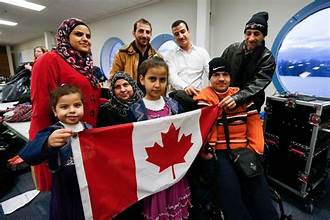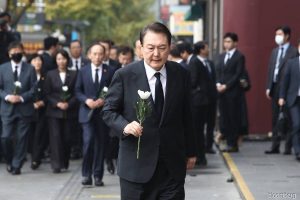“Reflecting on a Decade of Syria’s Refugees in Canada: Stories of Resilience and Hope”

Celebrating Freedom in Canada
In Mississauga, Ontario, a decade ago, a small group of Syrian refugees gathered in Celebration Square to celebrate a pivotal moment: the fall of Homs to rebel forces. However, when the news broke that Syrian President Bashar al-Assad had fled the country, marking the potential end of the civil war, this small gathering turned into a flood of emotion. Many of those present had fled Assad’s regime and found refuge in Canada.
Khaled Abdulwahed, now a Canadian citizen, was one of the people at the celebration. Having fled Syria at the age of 17 after participating in anti-government protests, Abdulwahed helped organize the event. His journey reflects the resilience of many Syrians who sought a better life in Canada, escaping the horrors of war and dictatorship.
Syrians Resettling in Canada
In 2015, under the leadership of Prime Minister Justin Trudeau, Canada launched a humanitarian initiative to resettle 25,000 Syrian refugees. This move stood in stark contrast to the rhetoric from Canada’s neighbor, the United States, where then-presidential candidate Donald Trump proposed a ban on Muslims entering the country. This initiative became a beacon of hope for thousands of Syrians fleeing violence.
Abdulwahed was part of this wave, arriving in Canada in 2016. Now an advocate for human rights, he believes that Canada’s welcoming stance provided not just safety, but a new sense of belonging. “Canada is our home now,” Abdulwahed said, emphasizing the importance of supporting Syria’s reconstruction from abroad.
Private Sponsorships: A Key to Successful Integration
Muzna Dureid, another refugee who arrived in Montreal in 2016, illustrates the power of private sponsorship. Dureid, who witnessed her brother’s arrest and the murder of an uncle in Syria, found refuge in Canada through a fellowship. When she arrived in Montreal, a local Quebec family offered her a place to stay, eventually sponsoring her entire family to join her.
Canada’s private sponsorship program, which allows individuals or groups to bear the cost of resettling refugees, has been crucial in resettling over 100,000 Syrians. This program highlights Canada’s community-driven approach to immigration, enabling refugees to not only survive but thrive in their new environment.
A Strong Sense of Belonging in Canada
For many Syrians, like Dureid, Canada has become more than just a place of refuge. It is a place where they can start anew, contribute to society, and plan for the future. Dureid, a human-rights activist, sees herself bridging both Canada and Syria. She hopes to one day help rebuild her homeland, especially in areas like gender equality.
“My dream is to help my country rebuild, while also supporting Canada,” Dureid shared. Many like her see themselves as part of both worlds, committed to improving life in Syria while living out their new lives in Canada.
The Changing Landscape of Immigration
While Canada’s refugee resettlement program was once hailed as a model of humanitarianism, recent economic challenges, including a rising cost of living and housing crisis, have led to shifts in immigration policy. There is growing uncertainty about whether Canada will continue to maintain such a generous approach to immigration, especially as global refugee numbers increase.
However, Syrians who have resettled in Canada still feel deeply connected to their new home. Many, like Dureid, Abdulwahed, and Maya Almasalmeh, now a sociology student in Ontario, have integrated into Canadian society and are giving back. Almasalmeh lost family in the siege of Deraa and credits Canada with giving her the opportunity to heal and grow. “Canada is the country that gave us peace. It gave me my education, and I’m here to give back,” she said.
Facing the Future: Returning Home or Staying in Canada?
Despite their deep connection to Canada, some Syrians are torn about returning home. Basel Abou Hamrah, a Syrian refugee in Edmonton, raised concerns about the future of Syria under the new regime, especially for LGBTQ+ individuals like himself. “It’s not safe for LGBTQ+ people in Syria,” Abou Hamrah warned, noting that even though Assad is gone, the country remains unstable.
For some, like Israa El Issa, a mother of four from Prince George, British Columbia, returning to Syria to reconnect with family and help rebuild is a priority. El Issa fled Aleppo and struggled to bring her parents to Canada. After losing her father to cancer, she now sees Syria’s potential return to safety as a chance to return to her roots.
“Canada gave us safety and dignity. Syria is our home, but Canada is our heart,” El Issa reflected.
Conclusion: A Bittersweet Homecoming
While Canada will always remain home for most Syrian refugees, the news of Syria’s shifting political landscape has sparked feelings of hope and hesitation. For many, like Abdulwahed and Dureid, their journey isn’t just about building a new life in Canada; it’s also about contributing to a better future for Syria. Despite the challenges, these resilient individuals continue to navigate the complexities of being part of two worlds, working toward rebuilding their homeland while preserving the peace and opportunities they’ve found in Canada.






